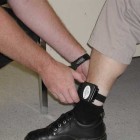
Research makes case for electronic monitoring of felony offenders
|
Electronic monitoring is being used for medium and high-risk felony offenders of all ages across the country. According to a recent study from the Florida State University College of Criminology, electronic monitoring is effective for adults and juveniles, especially when used with GPS technology. Researchers found 1 in 3 offenders placed under electronic monitoring would have gone to prison if the surveillance option had not been available to the courts. They say it costs six times more to incarcerate an offender in state prison than to place them on electronic monitoring. The research concludes that electronic surveillance is a cost effective tool, though not a perfect one.







